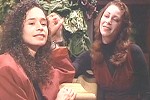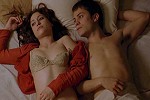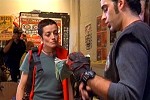 SHADOWS ON THE TUBE
SHADOWS ON THE TUBEOn this page: ANGELS IN AMERICA | BAR GIRLS | DOT THE I
NOT ANGELS BUT ANGELS | 2 SECONDS
< < M O R E | M O R E > >
If you have an film you want me to review - just ASK
last update
28.Jun.05
 ANGELS IN AMERICA
ANGELS IN AMERICA

|
dir Mike Nichols • scr Tony Kushner with Al Pacino, Meryl Streep, Emma Thompson, Justin Kirk, Ben Shenkman, Mary-Louise Parker, Patrick Wilson, Jeffrey Wright, James Cromwell, Michael Gambon, Simon Callow, Brian Markinson release US 7.Dec.03, UK 13.Sep.04 dvd • HBO 03/US 5h52  REVIEW BY RICH CLINE |
 Kushner adapted his own play into this six-hour tele-film examining Aids and sexuality in America during the Reagan years. It's an ambitious piece, beautifully filmed by Nichols with moments of real power scattered through it. But it's watered down by Kushner's refusal to make it cinematic by cutting down the surreal excesses that diffuse and weaken the engaging central storyline.
Kushner adapted his own play into this six-hour tele-film examining Aids and sexuality in America during the Reagan years. It's an ambitious piece, beautifully filmed by Nichols with moments of real power scattered through it. But it's watered down by Kushner's refusal to make it cinematic by cutting down the surreal excesses that diffuse and weaken the engaging central storyline.
The dual plot is extremely powerful: Louis (Shenkman) lets his Jewish guilt take over after he does the unthinkable and abandons his boyfriend Prior (Kirk) when he finds out Prior has Aids. Meanwhile, the good Mormon boy Joe (Wilson) is struggling to maintain his marriage to the chemically depressed Harper (Parker), even though he suspects he might be, unthinkably, gay. Joe's boss is notorious conservative Roy Cohn (Pacino), who has secrets of his own and is being cared for by a nurse (Wright) who's a friend of Prior's. Then Joe's mother (Streep) arrives in town and, surprisingly, really does sort things out.
This story is gripping and often intensely moving, but it's diluted by frequent forays into camp theatricality that are clearly supposed to be deeply emotional, but aren't. Most involve apparitions by an angel (Thompson) and the ghost of Ethel Rosenberg (Streep; most actors have multiple roles), as well as various ancestors and such. But they never add anything meaningful; they merely pad it out colourfully.
Performances are excellent, with Pacino stealing the film with a rough, sharp, snaky turn that grabs all the raw edges and throws them in our faces. And he's especially good in a few understated scenes. Streep's concerned and thoughtful mother is sheer perfection, to the point where she strangely takes over her son's part of the story in the end. But the film's heart is with Shenkmen and Wilson as two men who feel like they don't deserve to be loved.
This is serious storytelling that rambles badly, slips in some humour here and there, and cleverly brings out the harsh realities of the Reagan era. Some of it feels a bit rushed, other sequences simply don't work on film (they should have been left on stage where grand spectacle can work for its own sake). There's a lot of wacky, angry 'theology'. And the whole thing has a timid feel to it when it comes to its gay characters and relationships (maybe Six Feet Under has spoiled us with its astonishing honesty). The problem is that we don't really care about all the noble human spirit stuff; we want to care for the people themselves. This would make a terrific two-hour movie. [18 themes, language, nudity, some sex] 11.Sep.04
 BAR GIRLS
BAR GIRLS

|
dir Marita Giovanni; scr Lauran Hoffman with Nancy Allison Wolfe, Liza D'Agostino, Camila Griggs, Paula Sorge, Justine Slater, Michael Harris, Pam Raines, Caitlin Stansbury, Lisa Parker, CeCe Tsou, Lee Everett, Chastity Bono release US 7.Apr.95, UK 5.Jul.05 dvd • 94/US Orion 1h33  REVIEW BY RICH CLINE |
 This low budget film has the sunny, goofy tone of a TV comedy, with its sassy character interaction and witty asides. But it's too broad for its own good. The plot centres on Loretta (Wolfe), a sharp-tongued writer working on an animated TV series based loosely on her life as a lesbian who can't settle down. Loretta sets her sights on Rachel (D'Agostino), and their relationship evolves quickly. But both have enormous amounts of baggage, including clingy exes (Parker and Tsou), and a new woman (Griggs) threatens to divide them. And conquer.
This low budget film has the sunny, goofy tone of a TV comedy, with its sassy character interaction and witty asides. But it's too broad for its own good. The plot centres on Loretta (Wolfe), a sharp-tongued writer working on an animated TV series based loosely on her life as a lesbian who can't settle down. Loretta sets her sights on Rachel (D'Agostino), and their relationship evolves quickly. But both have enormous amounts of baggage, including clingy exes (Parker and Tsou), and a new woman (Griggs) threatens to divide them. And conquer.
This is a breezy examination of attraction and human connections, and where the film focuses on real relationships and the way people alternate from flirty to shy, it's actually authentic and astute. But frequent injections of cliched comedy don't help. Some of the dialog is just too clever to be real (such as a "sometimes I love/hate you" conversation). While the characters themselves are forced to indulge in corny behaviour like trying far, far too hard to make each other jealous.
And the acting is uneven. Central roles are well-played, but side characters are contrived and cartoonish--too slutty, weasely, whatever. All of them are intriguing, but only a few actually become fully fledged human beings. The film could have perhaps used more animated clips; there are only one or two brief glimpses. And the reliance on dialog and one main setting (a badly decorated bar) exposes the film's origins as a stage play. Which might be a better place to allow both the comedy and telling drama to connect with an audience. [18 themes, language, sexuality] 27.Jun.05
 DOT THE I
DOT THE I

|
dir-scr Matthew Parkhill with Gael García Bernal, Natalia Verbeke, James D'Arcy, Tom Hardy, Charlie Cox, Yves Aubert, Myfanwy Waring, Michael Webber, Jonathan Kydd, Michael Elwyn, Mark Spalding, Graham McTavish release US 11.Mar.05, UK 13.Jun.05 dvd • 04/UK 1h32  REVIEW BY RICH CLINE |
 This twisty British thriller maintains an enjoyably sexy tone, mixing drama, romance, action and black comedy as it heats up into a twisty thriller. The only complaint is that there are perhaps two or three twists too many.
This twisty British thriller maintains an enjoyably sexy tone, mixing drama, romance, action and black comedy as it heats up into a twisty thriller. The only complaint is that there are perhaps two or three twists too many.
Kit (Bernal) is a cheeky British-Brazilian guy in London who, with his two goofy buddies (Hardy and Cox), wants to be a filmmaker. One evening he meets a feisty Spanish girl, Carmen (Verbeke), and sparks fly. The problem is that she’s on her hen night, getting ready to marry a posh and very wealthy Englishman (D’Arcy). But everyone's hiding something--as jealousy, betrayal, mistrust and even murder rear their ugly heads.
Writer-director Parkhill nicely captures the energy and uncertainty of multi-cultural London. He keeps the film looking edgy and mysterious with security-camera angles, video clips and intriguing editing effects, building the tone of a thriller long before the story shifts out of romantic comedy mode. The early section feels like a caper movie, as Kit and Carmen come together and fall out, sneak around and get into trouble, all while revealing little lies about themselves.
This subtext draws us in--along with Bernal's and Verbeke's charming, sexy performances. 'Life is not a movie: good guys lose, love does not conquer all,' one of them says before the film cuts to a clever twist on The Graduate's wedding scene. And as the tone slowly shifts into something darker and more disturbing, Parkhill begins to unpeel these characters. Eventually we lose the ability to trust the film as we wait for the next revelation. This increasing nastiness gives the central romance a tragic tone, but it also leads to an iffy villain-explains-it-all monologue before the story tries to (predictably) pull the rug out from under us one more time. And some hammy acting in the climactic scenes kind of undermines the realistic and likeable work by Bernal and Verbeke. [15 themes, language, violence, sexuality] 7.Jun.05
 NOT ANGELS BUT ANGELS
NOT ANGELS BUT ANGELS

|
dir-scr Wiktor Grodecki with Peter 19, Jarda 18, Danek 14, Honza 19, Radek 17, Marek 18, Robert, Pepa 17, Mirek 18, Honza 17, Michael 14, Lada, Joseph Gregori, Marcel, Eda, Roman, Joseph, Radek, Ondra 94/Czech 1h20  REVIEW BY RICH CLINE • See also: BODY WITHOUT SOUL (1996) |
Basic interviews with the boys contrast against the sinister pimp and images of Prague's historical beauty--all accompanied by classical music. The conversations are almost shockingly frank--these young men are willing to talk about everything from how their parents kicked them out of the house to their arrival on the streets, their first experience, what they charge, their strangest clients, their hopes and their fears (mostly of Aids, which they clearly know very little about). Sexuality is a big issue, as some show a revulsion for homosexuality--it's a distasteful job for them.
The film is so matter-of-fact that it's almost hard to watch--this is normal life for them all. As the film progresses, it becomes clear firstly how their innocence has been stolen from them by desperation, and also how little they know of the realities of the lifestyle they're trapped in. This is essentially a rough first draft of the much more carefully crafted Body Without Soul (Mandragora has a dramatic plot), and like that second film Grodecki seems to poke a bit too deep. We feel like voyeurs preying on these innocent-looking cherubs. [18 very strong themes and language, nrief nudity] 13.Jul.04
 2 SECONDS [2 secondes]
2 SECONDS [2 secondes]

|
dir-scr Manon Briand with Charlotte Laurier, Dino Tavarone, Yves Pelletier, Pascal Auclair, André Brassard, JiCi Lauzon, Suzanne Clément, Jonathan Bolduc, Louise Forestier, France Galarneau, Alexis Belec, Marie-Hélène Gagnon release Canada 12.Sep.98 Toronto Film Fest, UK 2.May.05 dvd • 98/Canada 1h40  REVIEW BY RICH CLINE |
 There's a charming vibe to this gentle Canadian comedy-drama, even though not much happens. Kamikaze bicyclist Laurie (Laurier) is sacked from her job on a competitive team for pausing two seconds at the start line. Washed up at 28, she moves home to Montreal to live with her slobby physicist brother (Pelletier), who theorises about bending time with speed. Soon, Laurie takes a job as a courier so she can keep riding. She befriends a grumpy bike-shop owner (Tavarone) and realises that life can change in a moment, and that’s about it.
There's a charming vibe to this gentle Canadian comedy-drama, even though not much happens. Kamikaze bicyclist Laurie (Laurier) is sacked from her job on a competitive team for pausing two seconds at the start line. Washed up at 28, she moves home to Montreal to live with her slobby physicist brother (Pelletier), who theorises about bending time with speed. Soon, Laurie takes a job as a courier so she can keep riding. She befriends a grumpy bike-shop owner (Tavarone) and realises that life can change in a moment, and that’s about it.
Laurier has a cheeky face like a little kid you can't say no to--reminiscent of Audrey Tatou in Amelie. She's so likeable that the entire film wins us over with her cheeky grin, naturalistic performances from the other cast members and several nicely filmed cycling scenes. The plot itself is rather corny, with some cheesy cutaways and flashbacks, awkward storytelling and a clunky jazz-lite score. But it's all so endearing that we hardly mind. The relationships between the various characters snap with real life, and there are moments of darkness in a few relationships, notably with a cocky colleague (Auclair), a violent competitor (Lauzon) and Laurie's ill mother (Forestier). But neither this nor the physics lesson (that the faster you travel the slower you age) weighs the film down. Yes, it's pure fluff, but we don't mind at all. [15 themes, language, nudity] 16.May.05
